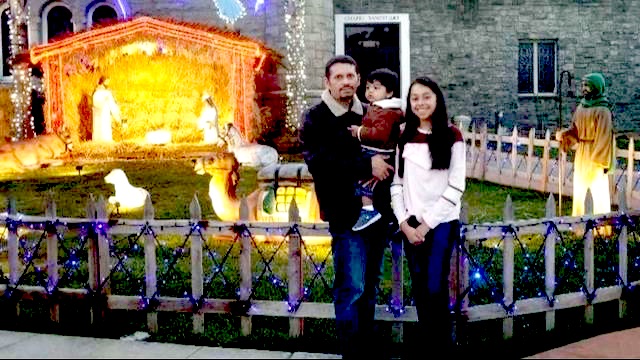This is an full English version of the article. An abridged version ran in the Paper Tiger. A Spanish version can also be found on the website with the headline “Familia de Daly City Amenazado por Politíca de Deportación.” Many thanks to Joanna Bethencourt and René Villicaña for their help with translation.
***
When Juan Francisco Mejía Penado learned that his mother had died, his Temporary Protected Status (TPS) was not the first thing on his mind. Yet, this past winter, the failure to file a handful of forms in the weeks after her death would eventually lead to his detention for more than three months in an overcrowded prison cell in Yuba City.
“When my mother passed away, I got a little bit frustrated… I missed the [TPS] renewal,” Juan said. “That I would never see my mother again was a little bit sad.”
Juan, who is from El Salvador, came to the United States in 1997 at age 18 after spending a few years in Guatemala. With the help of a lawyer, he obtained TPS, which allowed him to work legally in the United States without fear of deportation by Immigration and Customs Enforcement (ICE), whose Enforcement and Removal Operations division is in charge of deportations. TPS is a special immigration status in the gray area between the statuses of refugee, legal resident, and undocumented immigrant offered to people who flee countries like El Salvador that are too dangerous to return home. (President Trump has since tried to suspend TPS, although the attempt was blocked by the courts). TPS requires re-registration with the Department of Homeland Security within strict 60-day periods, and it was one of these re- registration periods that Juan missed in 2010.
Over the course of two decades, Juan has built a life for himself in Daly City. He and his wife, Wendy, bought a house together with his father. Their first child, Melissa, was born in November of 2006. Juan even overcame some of his earlier struggles with alcohol, which had led to a DUI in 2004.
Becoming undocumented again put all he had accomplished at risk.
“After [my mother’s death], problems started to come up between my dad and me,” Juan said. Disputes about money and the mortgage could always flare up into something worse. “He would say that he would call immigration, or things like that, because he’s a legal resident.”
It was an Immigrations and Customs Enforcement (ICE) investigation into his brother, though, that ended up separating Juan from his family.
Around 6:30 in the morning of November 29, 2018, one of Juan’s tenants noticed police outside their door. “They didn’t say they were ICE, [but] I noticed they had this little thing on their belt that said ‘ICE,’” Juan said. They were looking for Jesús Armando Mejía, Juan’s brother, who had violated the terms of his probation for a domestic violence conviction. “They kept asking me ‘Do you know where he is?’” Juan said. “I told them that he had moved out two or three years ago.” He tried to be as helpful as possible. “I was convinced that they wouldn’t come back because I told them the truth.” “During the previous administration, we had something called priority [for people convicted of felonies],” Rosa Mengesha, a spokesperson for ICE’s San Francisco office, explained. Under the Obama administration, these “priority one removals” of people like Jesús accounted for about 80 percent of deportations. Under President Trump, “that has changed a bit,” Mengesha said. “No person without status is exempt from removal.”
“At the end of the conversation, they asked for an ID,” Juan said. His driver’s license revealed him as undocumented. At no point in the conversation did the officers identify themselves as ICE.
Early the next morning, ICE returned. Around 9:00 AM, Juan decided he had to go out. “All of a sudden, when I was inside the car, three cars came to me. I saw the officer who I was talking with the other day, and he started screaming ‘Get out of the car! Get out of the car!’”
“I rolled down the window a little bit and asked the guy ‘What do you want? I already told you everything about my brother.’ He said ‘We need to talk to you today,not about your brother, but about you.’ And I knew that they had probably already found out that I was not legal here anymore.
So I just put the car in park and got out. That’s when they told me that they were from ICE and they had a warrant for me.” Juan would be detained for the next three months.
***
When I first met Wendy and Aaron, the Mejías’ two-year-old son, they had not seen Juan in over a month. At first, they held out hope that Juan might return in time for Christmas. Then, the federal government shut down on December 22, 2018. ICE’s prisons, known as deportation centers, stayed open with emergency funding. The immigration courts, however, ground to a halt.
“We were in limbo,” recalled Christine Hoang, an immigration attorney who works with women seeking asylum. Juan’s court case, like those of her clients and thousands of others, was frozen in place. To return home, Juan had to post bond. But he could only have his bond set in immigration court, which was not funded during the shutdown. As a result, Juan spent Christmas in a crowded detention center in Yuba City.
I met Wendy and Aaron two weeks after the missed Christmas deadline, at a meeting for young activists worried about immigration. At that first meeting, we watched news coverage of a rally that Melissa had organized outside of her middle school. Each time a picture of Aaron’s father appeared on screen, his face lit up. He pointed at his dad and said “Daddy! Daddy! Daddy!”
Juan’s detainment hit the whole family hard. Melissa, his twelve-year-old-daughter, started to attend therapy after her father’s disappearance. In addition to the sudden pressures of operating as a single parent on only one paycheck, Wendy had to support both of her children emotionally while staying as stable as possible herself.
The community overwhelmed Wendy with support, dropping by to keep her company and helping to cover household expenses and legal fees. “I never felt alone,” Wendy said. When Melissa organized a small rally outside of her middle school in December, fifty or so family friends and faith leaders showed up. At the end of the rally, they left notes for the Mejía family hanging on their Christmas tree.
Local activists increasingly became a part of the Mejías’ life. When Juan was released on bond in March, community organizers held a celebration. Naomi Moran, an activist and sophomore at Mercy High School, played in a corner with Aaron. She absolutely loved Aaron — one of her friends turned to me at one point and said, “She’s been telling me all this time, ‘Wait ‘till you see the baby.’” A pastor cleared her throat to give a speech. She said that Wendy deserves credit as “a mother and a leader in the community.”
***
After his arrest, Juan said, “They put me in a cell for an hour or two. There were these two guys, a Russian guy and a Spanish-speaking guy, telling me to sign these papers. He said ‘We want to deport you to Guatemala.’ I told them ‘I’m not from Guatemala, I’m from El Salvador.’ I remember they told me that if I didn’t sign it, they would sign it for me.” Juan refused and asked to see a lawyer or a judge. “They told me ‘No. You’re not seeing a judge. You will be deported as soon as possible.’’’
Forgery is illegal, and denying Juan and other immigrants access to a judge would violate the Fifth Amendment. Undocumented immigrants, like all other people in the country, are “entitled to due process of law in deportation proceedings” — a fair incarceration and trial that plays by the rules — under the Fifth Amendment to the United States Constitution, according to conservative icon Justice Antonin Scalia’s 1993 decision in Reno v. Flores. The ICE agents’ comments turned out to be nothing more than spurious threats.
Juan was quickly transferred from San Francisco to an ICE detention center in Yuba City, California, more than three hours away from home. He said the conditions were subpar. “I got there about 8:00 PM on Friday. It was about another eight hours before they could give me a bed.” The first cell they placed him in contained about twenty people. The next held fifty.
Juan and Wendy hired a lawyer for $2,500. Almost immediately, his case took a complicated turn. Before he got TPS, back in 1997, he was held in immigration detention for 27 days in Laredo, Texas. His case could not move forward without paperwork from Laredo. While the case stalled, Juan remained in prison.
Delays in the immigration trial process, whether from missing paperwork or between stages in a trial, are common. “The waiting time can be years… Their lives are on hold,” Hoang said. Juan said that “there were times when I wanted to sign my own deportation order. It had been three months, and I didn’t have any answers.” Finally, he said, “One day I checked with the immigration system over the phone, and there was a court date: February 26.”
Immigration courts themselves are not “real” courts, per se, in that they are part of the executive branch, not the judicial branch. Immigration judges are employees of the Department of Justice. Despite their unusual status, Hoang had no complaints. “I have not seen a judge be rude to a respondent. They treat every respondent [of whom they see triple digits each week] like they’re the only respondent of the day. I give them a lot of credit for that, because I do not think I could do that day in and day out.”
On March 19, Juan’s judge, Julie Nelson, set bond at $8,000, an unusually low amount for an immigration case. Within 48 hours, the local non-profit Faith in Action raised the money, and Juan returned home after 110 days.
***
The Mejías’ problems are not over. The hearing at which Judge Nelson will decide whether to deport Juan is on November 30, 2019, by sheer coincidence exactly a year after he was initially arrested. In the meantime, Juan needs a temporary work permit. He filed an application in late March. His father has changed the locks to their house, where their family had lived for more than 11 years. Still, Juan can finally look forward again, and start to think about his future.
“I really want to go back to Yuba,” he said. “I was there. There were not a lot of people who came to talk to [detainees]. There are a lot of people there that need help.” He’s kept in touch with a pastor who leads a church service at the prison every Sunday. He’d like to participate once he has a work permit.
“There were a lot of things that aren’t right. Twenty years ago, when I was in Laredo, Texas… they were more open with everything: food, clothes. The way it should be, you know? Here in Yuba, it was a jail.”
***
Odds and Ends:
My research for this article, which lasted for three months, included incredible interviews not just with Juan Francisco Mejía Penado, but with immigration lawyer Christine Hoang, ICE spokesperson Rosa Mengesha, and teen activists Lesley Ruíz and Naomi Moran. Here are some valuable insights that didn’t make it into the print edition:
- “There’s no way out from TPS to another type of status,” Christine Hoang said. “It’s not like there’s a path from TPS to a green card.” In other words, people with TPS almost never “become legal.” They either keep TPS or become undocumented again.
- Rosa Mengesha said that sanctuary city legislation may lower the number of deportations, but it also pushes arrests of undocumented immigrants into more personal spaces. Before sanctuary cities, “ICE officers would go and pick them up from the jail when they’re released.” Now, “There is less and less cooperation from local law enforcement, so they may go to other alternative means to detain someone… They might go into the house.”
- Hoang noted that there has been a lot of turnover among immigration judges under the Trump administration. “A lot of the judges who are more compassionate [have left],” Hoang said. “You’re talking about years, decades of experience being lost from the bench. It’s going to be interesting to see how these new judges rule.” For what it’s worth — and it may truly not matter — Julie Nelson, Juan’s judge, is an Obama appointee.
- In immigration court, ICE lawyers argued that Juan should be deported due to his DUI conviction. Lesley Ruíz felt that was a double standard. “Comparing his case to any white person who’s a citizen here, they would have done community service, you know? Two days in jail. A fine. [Yet] it could have ended his life and separated him from his family.”
- Hoang said that for newer immigrants who don’t have the community that the Mejías did, immigration lawyers often fill the breach. “Attorneys can be the only point of contact. Oftentimes, people in this situation have a lot of practical problems. They lose their apartment, or they need medical attention, or they need childcare… So every case requires hours and hours of work.”
- Ruíz wished the immigration system had “an agency that would write down [immigrants’] stories. Really actually do a background check on them, and see what kinds of support they need here.”
- Mengesha said that “in San Francisco, a lot of the [ICE] employees may not agree with everything. Everybody is part of the community here… If there were to be a new global order where there were no borders, I would be happy too. Personally.”
- Naomi Moran expressed concern about the impact of Juan’s detainment on Aaron. “I know he doesn’t really understand what is going on, which is sad. But I’m pretty sure he does miss his dad.” She paused. “I can’t imagine being without my dad.”






